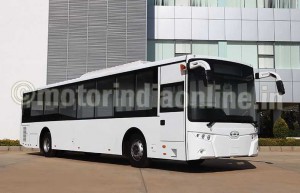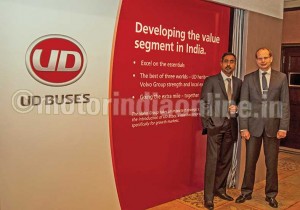 The Volvo Group signalled its intention of expanding its presence in the emerging bus markets by launching UD buses for relevant markets around the world, beginning with India. The introduction of the UD bus range, developed specifically for growth markets, is an important Volvo Buses’ strategic move as it aims to develop and lead the ‘value’ segment across the globe.
The Volvo Group signalled its intention of expanding its presence in the emerging bus markets by launching UD buses for relevant markets around the world, beginning with India. The introduction of the UD bus range, developed specifically for growth markets, is an important Volvo Buses’ strategic move as it aims to develop and lead the ‘value’ segment across the globe.
The announcement of the brand launch was made at a press conference in Bangalore by Mr. Håkan Agnevall, President, Volvo Group’s bus operations, and Mr. Akash Passey, Senior Vice President, Volvo Group’s bus operations responsible for the Asian markets. The fact that Volvo has chosen India as the first target market for UD buses reflects its long-term commitment and plans for the world’s second largest bus market.
The Indian mass market for longer buses is currently of a size of around 40,000 units, while the premium segment has around 1,000 premium buses. The ‘value’ segment is in between the mass market space and the top-end segment. Though not very large at present, the segment is tipped to register maximum growth during the decade and is expected to reach 10,000 units by 2020, of which Volvo is looking to gain a market share of at least 25 per cent by catering to the top-end within the value segment.
“Both the Volvo Group and Volvo Buses are highly committed to the emerging markets such as India. We have invested in industrial footprint, know-how and products in order to cater to these markets. It is part of our overall global strategy and we will continue to focus on it in the coming years. India, being the second largest bus market in the world, is of course of primary interest for Volvo”, said Mr. Håkan Agnevall, who was on his first visit to India in his current role.
Mr. Akash Passey said: “In February last year, we had stated that we will expand our presence in emerging markets, especially in India, by entering the medium/value segment. We are now ready for the next step by launching UD buses for these markets, starting with India. We foresee that UD buses will take the lead in developing the value segment in the country. There is huge potential in the middle segment, of which the targeted value segment offers high growth prospects. The Volvo Group will play a significant role in enhancing quality of transportation for an increased number of citizens.”
The UD bus brand will expand Volvo Group’s customer base, improve competitiveness and capture growth opportunities in India. The bus range will include both city buses and coaches and will be built at a new facility coming up near Bangalore.
“We will start with 12 m semi-low floor city buses by the end of 2014. We have already begun testing the buses in Bangalore and the performance has been very good. As a next step, we will enter the intercity coach segment in 2015 and subsequently look at exporting the products to relevant markets such as South-East Asia, Latin America and the Middle East”, added Mr. Passey.

The new UD bus range will be developed by leveraging Volvo Group’s global engineering network in combination with its heritage of Japanese craftsmanship and reliability. The new bus range will be supported by the group’s distribution network, providing service and parts. UD buses will offer passengers a modern transport solution while at the same time focus on operational essentials: fuel efficiency, reliability and optimized uptime.
“UD buses have had a strong brand presence in Japan and South-East Asia in the past. Now we renew and adapt the buses for growth markets, starting with India. This is a brand with a proud heritage, marked by its core value of ultimate dependability. It will offer passengers a modern travel experience and fulfil the specific needs of the customers in the value segment. With a multi-brand approach we look forward to playing an even more important role in the Indian bus market,” shared Mr. Agnevall.
Strong partner
UD buses will come under the umbrella of Volvo Buses in India with the first bus roll-out scheduled for the end of the current year. Volvo has partnered well-known Indian bus body builder SMK, which has over four decades of experience in the Indian bus market, to develop a new facility to manufacture the UD buses. The facility, located close to Volvo’s existing facility at Hosakote in Bangalore, will be ready by Q3 this year and will have an initial capacity of producing 500 buses per year, expandable to around 2,500 units in future. The products will come with around 40 to 45 per cent local content in the initial phase, with Volvo setting a medium-term localization target of 80 per cent.
The overall investment by Volvo and SMK together in the UD bus project stands at around Rs. 125 crores. In addition, the partners have also formed a new legal entity, in which Volvo holds a minority stake of 15 per cent. With the UD range, Volvo plans to target the 11 tier-I and 56 tier-II cities in the country and will follow its successfully-tested route of beginning with South India, followed by expanding to other parts of the country.
The Volvo Group has played an important role in the Indian bus market since the start of operations in 2001. All its products have met the requirements of the particular segments the group operates in and have set new benchmarks in terms of performance, safety and comfort, delighting both customers and passengers alike. Despite the severe slowdown in the Indian bus market over the last year and a half, Volvo has been able to maintain its share in the badly-hit premium market in which it operates.
The company has developed the public transport sector by establishing the premium coach segment and thereby redefining the public view on travelling by bus. Today, approximately 5,000 Volvo coaches and city buses are running on Indian roads. With the launch of UD buses, the Volvo Group enters a new chapter in its journey of transforming the bus market in India and also throughout the world.
The UD Heritage
The UD bus brand originated in Japan in 1947 when the company founder successfully ran the first product on a 3,000-km run. The brand promises to deliver the best of three worlds – Japanese Heritage, strength of the Volvo Group and Volvo’s local expertise – to its customers. It is a value brand which offers value for money and many. The brand was taken over by the Volvo Group in 2007 with its Japanese bus operations being put on hold in 2010. Now, after four years, Volvo has brought back the globally-renowned brand with an entirely new range and a clearly-defined strategy for developing markets.